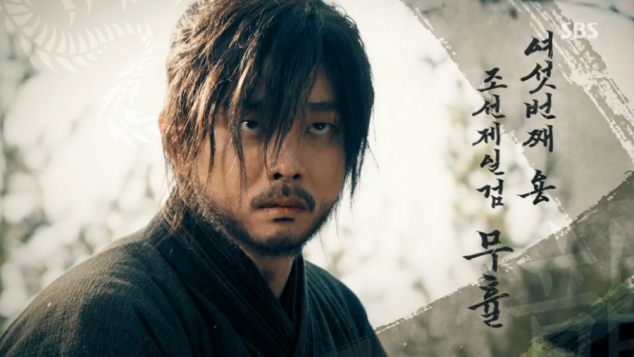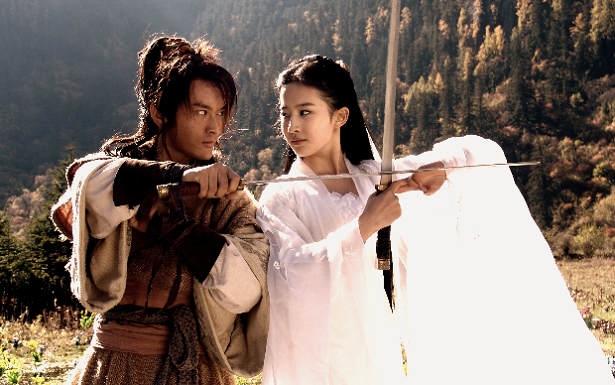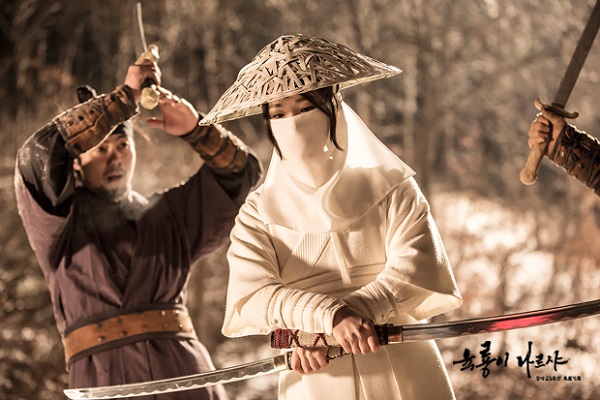Hong Kong fiction and its Korean counterpart, heroism and escapism, the corporeal and the illusory—entities in these pairs nestle within each other in symbioses at times wondrous and at times sobering.
Hong Kong martial arts fiction has made an impact on the South Korean popular culture scene since the 1960s. In 1967, the Hong Kong film Come Drink With Me, which tells the story of a swordswoman pairing up with a drunken kung fu hero to fight bandits, attracted a record-breaking 300, 000 moviegoers in Seoul and whetted the public’s appetite for more tales from the genre. From then till the mid-1970s, importers brought in more such movies from Hong Kong, producers responded enthusiastically with their own action films, major newspapers and publishers tried to out-win one another by serializing martial arts novels and comics, and radio stations aired adaptations of such novels. Hong Kong and Korean film directors also traveled to each other’s country to shoot martial arts series, exchanging professional insights along the way. The bubble burst after that, but in the mid-1980s mainland-born Hong Kong novelist Jin Yong brought on a second boom with his Condor Trilogy, selling over one million copies in South Korea and ushering in new imports of Hong Kong martial arts films.
Among the novels in the trilogy is Return of the Condor Heroes (1959), which depicts the love story of bullied orphan Yang Guo (Cantonese: Joeng Gwo, Korean: Yang Gwa) and a mysterious, tomb-dwelling maiden named Xiaolongnü (Cantonese: Siu-lung-neoi, Korean: Soyongnyeo) who takes him in as a ward and martial arts disciple. When 2015-16 Korean historical drama Six Flying Dragons‘ fictional legendary fighter Cheok Sa-gwang made her appearance, Soyongnyeo was whom some Korean speakers were reminded of. Both are graceful, ethereal beauties in gauzy white robes who have little combat experience and do not care for the pugilistic world, despite their formidable martial arts skills. Xiaolongnü’s artless nature is reflected in her ability to combine two swordplay techniques ambidextrously, which Jin Yong described as impossible for people with complicated thought patterns, and Sa-gwang resembles her in the ambidextrous sword-wielding aspect too.
Like in various other Korean period dramas, cliffs are where dreams and death dance a harrowing duet in the women’s storylines. In Sa-gwang’s case, the show’s gentle giant Moo-hyul, seeing no hope of defeating her in a critical fight, bargains on her dislike of killing and susceptibility to unanticipated changes, by dropping his own sword and charging at her unarmed. Stunned, Sa-gwang stops attacking and ends up hurtling down the cliff behind with him. Fortunately, her skills may have enabled her to control the descent, and Moo-hyul regains consciousness first. Not having the heart to kill Sa-gwang, though, Moo-hyul tends to her injuries and brings her food instead, raising hopes of future romance between the two. She leaves him a message the audience does not get to read until the finale.
In the novel, Xiaolongnü’s cliffside message to Yang Guo, after the now-married couple gets poisoned near it, is to meet again 16 years later. After spending the 16 years as a knight-errant, he realizes that she has jumped off the cliff so that the sight of her dying from her incurable condition will not cost him the determination to undergo treatment. His sideburns turn white overnight and a real-life poet’s tribute to his wife comes to his mind:
十年生死兩茫茫,不思量,自難忘。
千里孤墳,無處話淒涼。
縱使相逢應不識,塵滿面、鬢如霜。
夜來幽夢忽還鄉,小軒窗,正梳妝。
相顧無言,惟有淚千行。
料得年年腸斷處,明月夜、短松崗。
– 蘇軾《江城子.乙卯正月二十日夜記夢》
Translation:
“For ten years, death has created a vast distance between us. I think of you, without even trying to. Your grave lies a thousand miles away in a desolate area, such that there is nowhere I can confide my loneliness. Even if we were to run into each other, you would probably not recognize me. Dust covers my face. The hair on my temples is white as frost.
In the night, I dreamt that I was suddenly back in our hometown. Beside a little window was your figure, combing your hair and applying makeup as usual. We looked at each other, but could find no words. Tears streamed down our faces. I suppose you lie heartbroken too year after year in your resting place, on the moonlit ridge where pine trees grow.”
– “To the Melody of the Riverside City – A Record of My Dream on the Night of the 20th of the First Moon, 1075” by Su Shi
[References for interpretation adopted above: 1 | 2 | 3 ]
Feeling worse off since he has lost his wife for more years and does not know where her body lies or dream of her, Yang Guo plunges down the cliff to end his life, just as how one of the novel’s condors hits its head against a cliff to join its companion in death. In the lake below, Su Shi’s dream miraculously comes true for Yang Guo. An underwater tunnel leads him to a hidden valley where a cured Xiaolongnü has recreated their idyllic life in the tomb and looks as ageless as before. They briefly emerge to defeat Mongol invaders for Song China, then spend the remainder of their lives in seclusion.
That life of romantic isolation is the type of dream shared by Sa-gwang and her existing lover, a Goryeo prince. Tragically, political forces blow it to smithereens, first forcing him to be a puppet king, then deposing and killing him to secure the new Joseon dynasty. After his child dies too, she seeks revenge and ends up facing off against Moo-hyul and another warrior again, in a fight one netizen compares to the political one among their respective factions—Goryeo royalists, Joseon absolute monarchists, and Joseon constitutional monarchists. This time, the senseless battle between these simple, good folks culminates in Moo-hyul, now better-skilled, and his partner cutting her down. The cliff of immortality is no longer in sight.
On display here are two disparate approaches to martial arts fiction. Whereas Jin Yong’s novel fulfills the escapist potential the genre is known for, Six Flying Dragons subverts the concept of escapism through martial arts fantasy. Even though Sa-gwang is one of the top martial arts exponents in the country, possibly the top if she had a chance to demonstrate that through a proper one-on-one duel with the two men at the end, her skills cannot keep those she cherishes alive. Gliding through air, slicing off the top of a palanquin with one stroke of the blade and slaying hordes of enemies unassisted do not give her the omnipresence to affect at all times behavior her loved ones encounter or opt for the way the political atmosphere of fear and greed does. As in our reality, the condition of the nation is inescapable for everyone within its borders.
Absent as well in our sociopolitical universe are happily-ever-after endings. There is no end to new sources of troubles and no guarantee that breakthroughs will last. True heroism, then, is not a one-time hobby, but a continuous endeavor. In this regard, the novel’s ultimate choice of a hermit lifestyle for its chivalrous couple and Yang Guo’s willingness to abandon his service to the vulnerable by committing suicide are problematic. Sa-gwang, at least, sees the ramifications of her overall passiveness and political apathy, whereby the state’s welfare does not matter to her as long as her beloved and his children are happy and alive. Heroism often also requires self-deprivation, which Xiaolongnü and Yang Guo need undergo only for their mutual love. In contrast, Moo-hyul lives up to his title as one of the drama’s “dragons” by reversing his decision to value private sympathy for Sa-gwang over his public duty of protecting the future King Taejong and his team. Even if Sa-gwang and him could have a love-line, chances are, as with those of the other young dragons, it would have been painfully sacrificed for some goal larger than themselves.
Nevertheless, the world of the condor heroes likely triumphs over that of the dragons when it comes to the one parents would feel at ease recommending to their children. Xiaolongnü’s universe—where the righteous way of life prevails and the good do not kill each other for the greater good—sometimes embodies their own youthful ideals, back when they have yet to accept, even begrudgingly, the need for anyone to employ less than impeccable means for survival and fight meanness with more meanness. Even now, it probably represents the best among people who have touched their lives and to whom they must concede defeat whenever they take another ruthless step in micro-political games of their own. From time to time, they may wonder, could ceaseless devotion and some of the self-denial the dragons stand for be employed to find a way to break free from this mode of living?
On occasions like these, the unreal in fiction conveys the very real dissonance encountered in reality, where conditions needed for well-being or even living conflict with the destructive dynamics all around. Although overuse may have greatly diminished the element of surprise, suspenseful cliff-fall scenes share with Su Shi’s elegy the same yearning to keep someone or something alive: people, relationships, possibilities (romantic or otherwise), etc. And to live while forsaking dreams and principles is to be merely half-alive. The effectiveness of fantasy plots at affirming psychological truths may thus be one factor behind the cross-border appeal of martial arts fiction.
Even when Six Flying Dragons returns to realism through its rejection of martial arts supremacy, its characters experience a feeling of unrealness that viewers may find familiar from off-screen experiences. Moo-hyul’s partner tells a self-reproaching Sa-gwang that the deaths of her loved ones are not her fault, but the consequences of an abnormal world—a world as abnormal as, one might add, the shadowy and gravity-defying one martial arts fiction authors portray and refer to as “rivers and lakes.” With a bitter smile, she remarks that that sure is some consolation and turns to Moo-hyul before drawing her last breath, “Thank you ….. for taking my life.”
Closing his eyes, Moo-hyul lets out a soft, pained sigh. Her message after the cliff incident was: “Thank you for saving my life.”








Special thanks to Freda @ Aromatic essence,
Freda @ Aromatic essence,  paulavandeveer and
paulavandeveer and  elle for their expression of support in the prelude to this post.
elle for their expression of support in the prelude to this post.
You may also enjoy reading Dr. Crystal S. Anderson’s “In Wuxia, Princess is Not a Bad Word: Nirvana in Fire.”
True heroism is indeed a lifetime endeavor… It can be easy sometimes and also hard sometimes, but in the end it’s all about how much one helps others instead of harming or being indifferent to them. Nobody is perfect, but with compassion it’s easier to become a true hero.
Your commentary was very thoughtful and read like a well-informed essay. I didn’t know that Hong Kong films affected Korean productions to that extent, and it was interesting to know.
That poem made me tear up as I was reading it… I have taken interest in Hanshi a while ago, and I’m thinking that I should read up on some to expand my hanja vocabulary… Thank you for sharing the translation.
Do you know about Kuiwon? He’s a Korean-American with an excellent blog focusing mostly on poems written in Chinese. I think you would like his blog. 🙂
https://kuiwon.wordpress.com/
What a coincidence! Kuiwon was actually the invited blogger mentioned in an announcement on this site some time back. Unfortunately, that guest post seems to have run into some major hiccups. Maybe you can help contact him? 🙂
You mean send him an email saying that the post is down? I’m sure he would hear you just as well. Sorry if I don’t get what you mean…
Sorry if I don’t get what you mean…
It’s a draft he’s been preparing for a very complex topic, not a post that’s already published. Maybe I’ll try contacting him again.
Thanks for commenting anyway! That was probably the most touching ancient poem I’ve ever come across in any language. There’s actually a translation that is better than mine at capturing the lyricism of the lines on page 55 of this paper (see “Weng’s version”): http://journal.acs-cam.org.uk/data/archive/2014/201402-article4.pdf , but I feel that some scenes have not been accurately recapitulated.
The other translation has been a bit modified to be poetic and wasn’t bad, but for learning and comprehension I like more literal translations, like yours, better. Thank you for sharing, though!